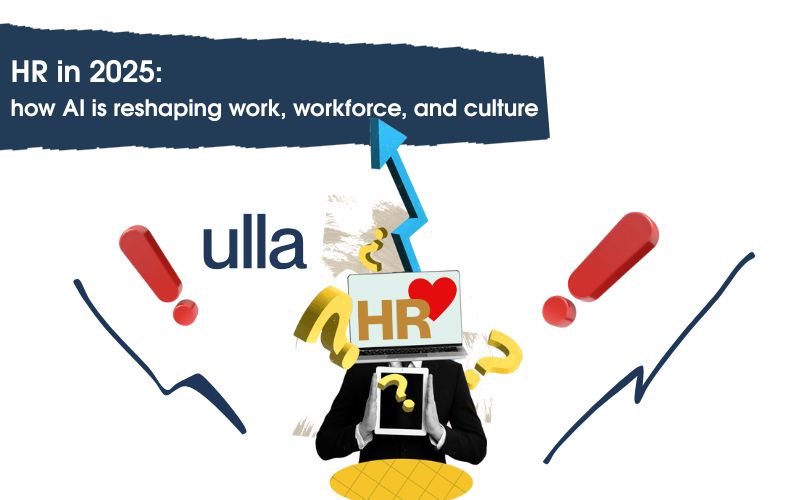HR in 2025: how AI is reshaping work, workforce, and culture

As of 2025, generative AI has shifted from hype to core business tools. HR departments are now at the forefront of this change - adapting to new tech, redefining workplaces, and reshaping employee value in profound ways.
1️⃣ From pilot projects to enterprise-scale AI
- 89% of CEOs are exploring, piloting, or implementing "agentic AI" (autonomous AI systems) - this insight comes from the Fortune/Deloitte CEO Survey (Spring 2025), based on 111 CEOs across 21 industries (Deloitte)
- 61% of global CEOs said they’re actively adopting AI agents and preparing to scale them, according to a survey of 2,000 CEOs by IBM’s Institute for Business Value (May 2025) (Ciodive)
- Over 90% of executives expect to boost AI spending over the next three years, with 55% planning an increase of at least 10%, per McKinsey’s “AI in the Workplace” report (published 4 months ago) (McKinsey, Deloitte)
- 83% of CEOs are investing in AI across major use cases (from customer service to sales and operations), while around 39% say AI and tech are among their top priorities for immediate value creation - reported in the Oliver Wyman Forum’s 2025 "CEO Agenda" and New York Stock Exchange
AI isn’t just experimental anymore - organisations are professionalising its use in HR, integrating AI across workflows - from recruitment to engagement .
2️⃣ AI enables agile, human-centred organisations
Deloitte’s 2025 report emphasises balancing stability with agility, and automation with human empowerment. HR must evolve accordingly:
- Build new work anchors that support fast-paced yet stable operations.
- Design a future-ready employee value proposition, where AI complements rather than replaces human skills (Deloitte - 2025 Global Human Capital Trends, Linkedin David Green)
3️⃣ Skills-based work and internal mobility
- With roles shifting rapidly, 81% of employers already hire based on skills vs. degrees insulation.org.
- AI helps maintain dynamic skills taxonomies, matches talent to internal projects, and supports agile workforce planning aihr.com.
4️⃣ AI as a Tool for engagement and retention
AI-powered HR tools are gaining traction in 2025:
- 70% of organisations now use AI for engagement, recruitment, or performance analytics (InsightGlobal, Insight Global “AI in Hiring”)
- AI-driven surveys increase response rates by 45%, sentiment analysis detects disengagement 30% faster, and predictive AI forecasts turnover with 87% accuracy
- Reports predict AI tools will reduce turnover by 25% and burnout by 30% by year-end .
5️⃣ Performance management leaves bias behind
- Adoption of AI for performance reviews has surged - 58% of organisations now use it, with 65% of HR pros reporting efficiency gains (performyard.com).
- AI-enhanced reviews offer bias reductions up to 25%, while tracking productivity improvements of up to 22% .
6️⃣ Predictive analytics drives strategic HR decisions
- 72% of HR professionals say AI improves workforce planning capabilities (hirebee.ai).
- Predictive models now forecast skills gaps years ahead, enabling proactive talent development .
- By 2025, 90% of HR decisions will be supported by AI-based analysis
7️⃣ Data privacy, ethics, and trust matter
- 78% of employees expect full transparency in AI-driven decisions; 67% of HR leaders prioritise ethical AI use
- The rise of AI ethics boards in 80% of organisations by 2025 reflects growing awareness of responsible AI .
- The balance between C-suite ambition and employee skill readiness reveals a 20% gap in confidence levels - highlighting the need for better AI training and guidelines (accenture.com).
🔭 So what does this mean for HR leaders?
HR must become a trusted navigator in the AI-led transformation. That means:
- Integrating AI into core HR processes - from hiring and training to engagement.
- Ensuring AI is privacy-first, bias-aware, and used to augment human skills.
- Holding AI to ethical standards, supported by frameworks and transparency.
HR leaders are uniquely positioned to drive this change by embracing data-powered insight and elevating human potential.
💡 A quick peek at what’s coming next
In the next article, we'll dive deeper into advanced tools like emotional engagement analytics and scientific personality profiling - all built with privacy at the core. These systems can alert HR to early signs of team disengagement and boost workplace wellbeing. It's all part of the continued AI journey - where insight meets empathy.
✨ Why it matters in 2025
The move isn’t about replacing people - it’s about helping them thrive. As AI adoption scales, HR has the chance to lead with agility, trust, and insight. The future of HR: strategic, data-secure, human-first.
Stay tuned for part two - and built-in glimpses of how tools like Ulla help bring these trends to life.
Try ❤️Ulla for HR ❤️- Demo 📩 info@ulla.bot
.jpg)
Posted in Uncategorized on Jun 12, 2025.







